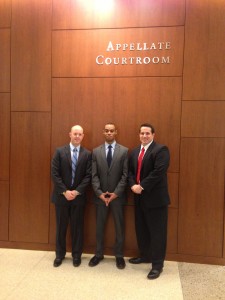Marquette Wins the National Moot Court Competition Regional and Advances to the Nationals in New York
 I had the privilege of working with two outstanding National Moot Court Competition (NMCC) teams again this year. The Region VIII round of the NMCC was hosted by Marquette this weekend and included ten participating law schools. This year Marquette won the regional competition, winning all five of their rounds and advancing to the nationals in New York City this coming February.
I had the privilege of working with two outstanding National Moot Court Competition (NMCC) teams again this year. The Region VIII round of the NMCC was hosted by Marquette this weekend and included ten participating law schools. This year Marquette won the regional competition, winning all five of their rounds and advancing to the nationals in New York City this coming February.
Please congratulate team members Hans Lodge, Brendon Reyes, and Robert Steele, whose team advanced to, and won, the final round of competition (top team out of sixteen). The team additionally received the third highest brief score at the competition. Attorneys Emily Lonergan and Jason Luczak coached the team.
Please also congratulate team members Andy Gordon, Mindy Nolan, and Kaitlyn Reise for their performance at the competition. Attorneys Jesse Blocher and Michael Cerjak coached the team.
The NMCC is sponsored by the New York City Bar and the American College of Trial Lawyers. Over 180 law schools compete across the country.

